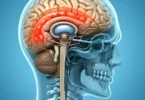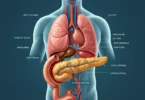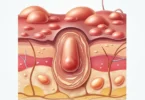Cushing Syndrome
Cushing’s syndrome is hormonal and also genetic disease which lead to Type 3 Diabetes and other disorders. In Cushing’s syndrome, the patient suffers from an excess amount of the body’s own cortisone. Cortisone is a vital hormone that is secreted in increases stress situations. It increases blood sugar levels and provides energy by stimulating the breakdown of prepared fat (lipolysis) and proteins (Proteinolyse) in the body. Thus by elevated blood glucose levels, the pancreas is continuously stimulated to produce insulin. After some time, this result in a reduced response of the cells to insulin (insulin resistance) and thus lead to a Type 3 diabetes.
Causes Of Cushing’s Syndrome
The absolute majority of Cushing’s disease is caused by a benign tumor in the pituitary gland, which result in an overproduction of the hormone ACTH. Tumor is normally caused due to changes at genetic level. This ACTH then stimulates adrenal hormone production and thus leads to an increase in cortisol in the blood. In addition, the source of ACTH overproduction however are also in other organs (ectopic Cushing syndrome). In addition, tumors of the adrenal gland (benign adenomas or malignant carcinomas) can directly produce cortisol.
Symptoms Of Cushing’s Syndrome
An early sign of the disease is the
- Weight gain, especially on the trunk.
- Appearance of hamster cheeks and sometimes called a round FULLmoon face.
- Typically, arms and legs remain slim. This stretch marks may appear on the abdomen, hips and shoulders which are redish in colour
- The Cushing’s disease through an increased in vascular fragility, also increased incidence of bruising and a poorer wound healing.
- May lead to an increase in abnormal growth of body hair like male in an affected woman called Hirsutism
- Appearance of acne in both sexes
- Similarly, the skin may be thinner overall (“parchment skin”).
- Typically, the monthly menstrual period of women becomes irregular or stops altogether (amenorrhea).
- Often it comes to a loss of muscle strength (myopathy), which particularly affects the buttocks and thigh muscles. This leads typically to difficulty climbing stairs or getting up from a squatting position.
- Furthermore, an excess of cortisol negatively affect the emotional impact .
TREATMENTS Of Cushing’s Syndrome
Surgery
The treatment of a pituitary tumor that triggers a Cushing’s disease is surgical removal of the tumor called Transsphenoidal pituitary surgery. Transsphenoidal pituitary surgery should normally done through a so-called minimally invasive technique. It is normaly done by microscope and endoscope through nose and sphenoid sinus.
Radiotherapy
If pituitary surgery not cure the disease than than irradiation of pituitary gland may be prove beneficial. This are sensible long term option which reduce the production of hormone.
Drug Therapy
Treatment of Cushing’s disease can occur temporarily through drugs. Medications (including Metyrapone, mitotane) can help to control the disease, but they have side effects which are difficult to control and can partially be administered only through the vein.
Bilateral Adrenalectomy (Adrenalectomy)
If it is not possible to control the hormone overproduction by any of the methods described, than sometimes it is useful and necessary to remove both adrenal glands. If the adrenal glands are removed, they cannot produce too much cortisol more. However, this also means that a lifetime hormone replacement therapy is now necessary to compensate the completely missing function of the adrenal gland. Typically, this is achieved by taking hydrocortisone and fludrocortisone.
Aftercare
After a successful operation, it takes a long time, usually months, sometimes for several years, to recover the normal functioning of the pituitary gland and the adrenal. Until then, a substitute of cortisol is taken in the form of tablets (hydrocortisone). Until the body gets used to its new equilibrium, it can take months and possibly at this time the patient has to adjust to temporary headache, body aches, fatigue and exhaustion. The healing of Cushing’s disease, means the return to normal life.
Note
Must not be forgotten that an untreated Cushing’s disease often leads to long-term premature death.






